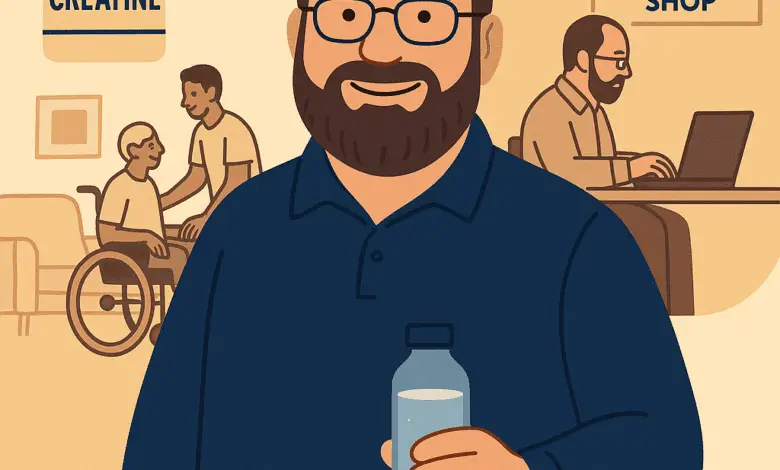
Creatine and Healthy Ageing: Evidence-Based Support for Disabled People and Carers
I’ve found creatine really helpful in my daily life, both as a carer and as someone managing the physical and mental demands of running Disability Horizons Shop. I wanted to share my experience — and what the research says — so others can make informed choices about how it might help them too
Key Takeaways
| Insight | Why It Matters |
|---|---|
| Creatine is not just for athletes | It supports energy, cognition, and muscle strength for everyday life. |
| Evidence-backed for ageing and disability | Dozens of studies show benefits for strength, fatigue, and brain health. |
| Safe and affordable | Approved as safe for long-term use, even in older adults. |
| Supports carers’ stamina and focus | Helps manage mental fatigue and physical effort in demanding care roles. |
| Practical self-care tool | A small, simple supplement that can make daily life feel more manageable. |
How I Discovered Creatine’s Real Potential
Like many parents, I first heard of creatine through my son, who was using it as a teenager for gym workouts. At the time, I thought it was just a bodybuilding supplement — something for muscle gain, not middle-aged carers.

Curious (and slightly sceptical), I decided to do some digging. What I found surprised me: creatine isn’t just for athletes at all. It’s a naturally occurring compound that helps our cells recycle energy. Research shows it supports both brain and muscle health, and levels naturally decline with age or long-term inactivity.
That discovery made me rethink it completely — not as a “performance supplement,” but as something that could help me cope better with the physical and mental load of daily life.
Why Creatine Matters for Ageing and Disability
Creatine fuels the body’s energy system — the ATP-phosphocreatine cycle, which provides instant power for movement, focus, and recovery.
As we age, or when health conditions limit movement, creatine stores can drop by 8–10% per decade (Frontiers in Nutrition, 2024). That decline can show up as slower thinking, weaker muscles, and longer recovery times after exertion.
For disabled people and carers, that energy shortfall can make a real difference in daily life — everything from standing, lifting, or typing to concentrating through long, demanding days.
What Happened When I Started Taking It
I began taking creatine daily after breakfast, mixed into a pint of water. I also added a few things for my own personal health mix — chia seeds and ground flaxseed (for digestion), plus turmeric and lion’s mane powder.
I wasn’t expecting much, but within a couple of weeks, I noticed small changes:
- I felt less achy in the mornings — something that had become routine with age.
- My energy didn’t dip so sharply in the afternoons.
- I was waking up earlier and coping better with broken sleep, which comes with my caring responsibilities.
- My thinking felt sharper and steadier, especially on long writing or marketing days.
As a carer and the manager of Disability Horizons Shop, my days are a mix of emails, content planning, collaborations with entrepreneurs, and hands-on warehouse work — packing orders, shifting boxes, managing stock. The difference wasn’t dramatic overnight, but it was real. I simply felt more capable, physically and mentally.
Evidence-Based Benefits of Creatine
The science backs up what I noticed.
1. Strength and Mobility
Studies consistently show that older adults using creatine alongside light exercise gain more muscle mass and strength than those who exercise without it (PubMed, 2023).
For wheelchair users or people with limited mobility, it can support everyday strength and reduce fatigue — helping with transfers, standing, or longer periods of sitting comfortably (Helix Sports Medicine, 2024).
2. Brain Function and Mental Clarity
Creatine enhances brain energy metabolism, especially during mental strain or sleep deprivation.
A review in Frontiers in Physiology (2024) found improvements in memory, focus, and executive function in older adults. Researchers at the University of Kansas even observed cognitive gains in early Alzheimer’s trials (Frontiers in Physiology, 2024).
I can relate — I found I could work through complex marketing plans or write articles without my concentration fading halfway through the day.
3. Fatigue and Mood
Research also shows creatine can reduce mental and physical fatigue in demanding situations (PMC, 2021).
That’s crucial for carers and disabled people managing limited energy or fluctuating conditions. For me, it meant fewer “foggy” mornings and a more stable mood, even after disrupted nights.
Creatine and Disability-Related Conditions
While research on disability-specific benefits is still emerging, several promising findings stand out:
- Muscular Dystrophy and Neuromuscular Disorders:
Meta-analyses show creatine can improve muscle strength and endurance in muscular dystrophy and similar conditions (National Library of Medicine, 2022). - Cerebral Palsy:
Studies suggest creatine may help reduce inflammation and support muscle energy metabolism in children and adults with cerebral palsy (PubMed, 2021). - Chronic Fatigue and Post-Viral Conditions (ME/CFS, Long COVID):
A Wiley Online Library study found creatine supplementation improved muscle function and reduced fatigue in people recovering from long COVID (Wiley Online Library, 2023).
Nutrition specialists also report increased phosphocreatine levels and energy availability in ME/CFS and fibromyalgia (Post-Viral Nutrition, 2024).
For people with reduced mobility, chronic illness, or long-term fatigue, creatine’s ability to restore cellular energy may be a meaningful, low-cost support tool alongside medical care.
Why It’s Especially Helpful for Carers
Caring is physical, emotional, and mental work all at once. You’re lifting, thinking, supporting, and often sacrificing sleep.
Creatine can’t replace rest, but it can help the body use energy more efficiently — something carers and healthcare workers can feel in daily stamina and focus.
A study on mental fatigue found that participants taking creatine maintained cognitive performance after sleep deprivation (Frontiers in Nutrition, 2024).
In my own routine, I’ve noticed I manage broken nights better. I don’t crash mid-morning or rely on as much caffeine. It’s not a miracle fix — it’s a quiet, consistent support that makes demanding days a bit more sustainable.
How to Get Started Safely
Creatine is one of the most studied and safest supplements available. It’s approved by the FDA as “Generally Recognised as Safe” and endorsed by the International Society of Sports Nutrition as safe even for older adults.
Recommended dose:
- 3–5g daily (about one teaspoon) mixed with water or juice
- No loading phase needed
- Take with food if preferred
- Stay well hydrated
Long-term studies — even in people with Parkinson’s disease — found no negative effects on kidney or liver function (Northeastern University, 2025).
If you have kidney disease or take prescribed medication, do check with a doctor first.
Practical Tips
- Choose creatine monohydrate supplement, it’s fairly cheap and can be bought in large tubs or resealable packets.
- Avoid “blends” with additives or caffeine.
- Track small changes in your strength, mood, or energy after 3–4 weeks.
- Combine with light resistance exercise or daily movement for best results.
- Keep your routine simple — consistency matters more than timing.
My Reflection
What started as curiosity about a “gym supplement” turned into one of the simplest, most useful additions to my daily self-care. I’m not aiming to build muscle — I’m aiming to stay capable, to keep up with work, family, and caring without burning out.
It’s not about peak performance. It’s about sustainable energy and independence — something every disabled person and carer deserves support to maintain.
References
All linked studies are from peer-reviewed sources including Frontiers in Nutrition, Frontiers in Physiology, PubMed, Wiley Online Library, Northeastern University, and Post-Viral Nutrition (2021–2025).